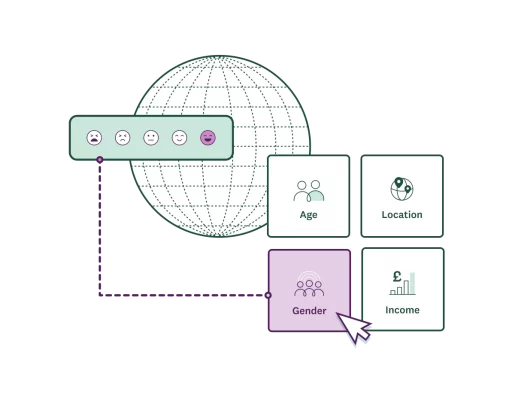CUSTOMER STORY
Women’s March Global drives social change with global data
Learn how Women's March Global conducted a first-of-its-kind survey on issues impacting women and gender-diverse people.

HEADQUARTERS
New York, NY
COMPANY SIZE
50+
INDUSTRY
Non-profit
OVERVIEW
Women’s March Global is dedicated to gender equality and grassroots community mobilisation, and it knows that solid data can spark real social change. When the non-profit organisation decided to launch a groundbreaking global survey on women’s issues, it turned to SurveyMonkey Enterprise to bring the ambitious project to life and collect potentially life-changing insights.
THE CHALLENGE
Empower women worldwide
In an early-2020 check-in call with its worldwide chapters, Women’s March Global uncovered a devastating pattern: domestic violence was up globally and women’s issues were falling through the cracks of government initiatives.
“Our chapters were not seeing pandemic relief dollars going to the women and gender-diverse people who needed them, and we were not seeing solutions for the surge in domestic violence,” said Betsy Scolnik, board chair of Women’s March Global. “It created an incredible sense of urgency globally.”
The non-profit organisation needed comprehensive data to lobby local governments and ensure that women and gender-diverse people were being heard. Although that data is typically hard to come by, which is a fact highlighted by the rapid and sustained crises of 2020, Scolnik and her team found that SurveyMonkey was up to the task.

THE ANSWER
Launch a first-of-its-kind global survey
For its Global Count survey, Women’s March Global brought together a committee of experts from the University of Maryland, civil rights activists and partner organisations to develop survey questions that would give women and gender-diverse people an opportunity to highlight issues and call out the barriers to addressing them.
Because the survey was being launched in over 170 countries, it needed to be accessible in 15 languages. It also had to be capable of collecting nuanced insights. “The idea of a ‘one-size-fits-all’ women’s issue platform is a patriarchal, racist approach to philanthropy,” explained Scolnik. “Location, ethnic background, environment, societal systems and more affect what individual women need.”
The survey analysis process was another important consideration. As a non-profit organisation with limited staff, Scolnik wanted to ensure that she and her team could analyse tens of thousands of survey responses in a way that would support rapid, evidence-based intervention in local communities. With SurveyMonkey, they had the exact features they needed, from built-in analysis to translation and API services.

“This survey is helping organisations on the ground think through who they fund, how they fund them and which areas make a true impact.”
Betsy Scolnik
Board chair
THE RESULTS
Vital data that supports real change
The first Global Count survey was launched on 21 January 2021, the day that the annual Women’s March would normally have taken place had it not been for Covid. Responses numbered in the tens of thousands within just a few weeks and the Women’s March Global team was even able to successfully collect responses from hard-to-reach locations.
As responses came in, the non-profit organisation shared high-level SurveyMonkey dashboard access with chapter leaders so they could quickly see what was urgent in their communities. SurveyMonkey's analysis capabilities made it easy to map common keywords used in the responses to open-ended questions. This helped Scolnik and other Women’s March Global leaders identify which issues were flagged the most per locality.
Violence against women was the top issue globally. With SurveyMonkey, Women’s March Global could see the national and local differences in how women viewed the problem and the barriers to solving it, whether political, cultural or economic. That information empowered the organisation to develop targeted action plans with individual chapters to help NGOs and governments effectively direct support and develop policies. Women’s March Global also shared those findings with 75 partner organisations, strengthening its international line of communication and ensuring an even broader impact for all that valuable data.

Fuel your non-profit mission with feedback
Create programmes and experiences that maximise impact in the communities you serve.
Want to learn how SurveyMonkey can help your organisation?
Request an Enterprise demo today.